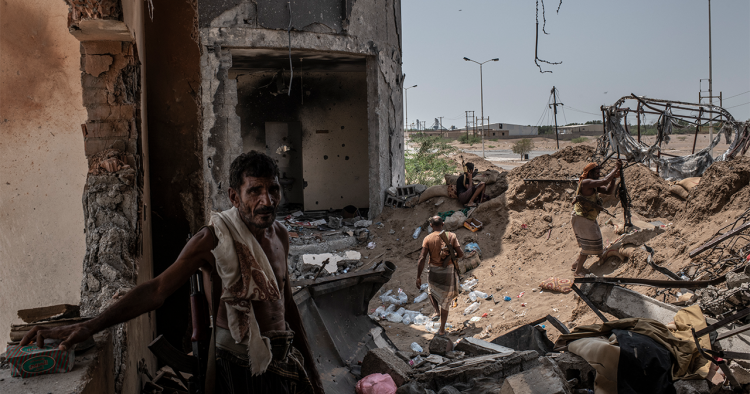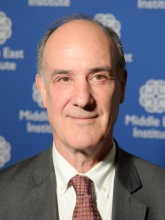In this week's Monday Briefing, MEI experts Gerald Feierstein, Paul Salem, Gonul Tol, Charles Lister, Jonathan M. Winer, and Marvin G. Weinbaum provide analysis on recent and upcoming events including the ongoing conflict in Yemen, the potential impact of the midterm elections on US Middle East policy, U.S.-Turkey rapprochement, escalating tensions in northern Syria, the upcoming Palermo conference on Libya, and the potential for political fallout in Pakistan and peace talks in Afghanistan.
Yemen: Between war and peace
Gerald Feierstein, Director of Government Relations, Policy and Programs
Days after both U.S. and U.K. political leaders called for a ceasefire in Yemen and urged the Saudi-led coalition to halt further military operations in urban areas, the coalition renewed its drive to seize control of the strategic port of Hodeidah. The latest reports indicate that coalition forces, with Yemeni elements leading the offensive, are making progress in cutting ground links between Hodeidah and the rest of the country.
It’s unclear whether the new offensive has been coordinated with either U.N. Special Envoy Martin Griffiths or the coalition’s key Western partners, the U.S., U.K., and France. Prior to the beginning of the offensive in late spring, coalition representatives insisted that the drive to take the port, launched after talks on its peaceful transition to third-party control stalled, was intended to strengthen the U.N.’s negotiating position. The loss of Hodeidah would be a strategic, economic, and psychological blow to the Houthis.
Whether or not it succeeds, the Hodeidah operation is fraught with risk for the coalition as well. Against the backdrop of international anger over the cold-blooded murder of Saudi journalist and U.S. resident Jamal Khashoggi, frustration with the conflict in Yemen continues to mount. Any mass-casualty event in Hodeidah could effectively end Western cooperation with the coalition. Already, the U.K. has indicated it might be prepared to submit a new U.N. Security Council resolution that would increase pressure on the coalition to accept a ceasefire, while expectations in Washington persist that Congress will take aim at U.S.-Saudi security cooperation once members return after the midterm elections.
Midterms and the Middle East
Paul Salem, President
If Democrats secure a majority in the House of Representatives in this week’s midterm elections, it would have an impact—but only quite limited—on the administration’s Middle East policy. Foreign policy remains largely the prerogative of the president, and past presidents like Barack Obama and George W. Bush have continued on their foreign policy trajectories even after midterm losses. In addition, in this election, Middle East policy issues have not figured highly in voters’ minds.
Nevertheless, a House majority would give Democrats chairmanship of key committees such as Foreign Affairs, Armed Services, and Intelligence. It also would enable them to launch investigations, with subpoena power, that could harass the administration. Based on the results of the report from Special Counsel Robert Mueller, they could possibly begin impeachment proceedings against the president as well.
A Democratic majority might oppose strong secondary Iran sanctions on allies in Europe and Asia, and might try to restore some assistance to the Palestinians. It also might not be supportive of an open-ended US military presence in Syria. The biggest difference might be over the relationship with Saudi Arabia, and in particular US cooperation in the war on Yemen. The administration already tried to get ahead of this issue last week when the secretaries of State and Defense called for an end to the fighting in Yemen.
However, all in all, the foreign policy trajectory of the Trump administration is likely to continue in its broad outlines, regardless of what happens on Tuesday.
US-Turkish ties are warming, but flashpoints remain
Gonul Tol, Director for Turkish Studies
Relations between Turkey and the U.S. have been improving since Andrew Brunson, an American pastor jailed in Turkey on terrorism charges for two years, was released on Oct. 12. Last week, in another sign of warming diplomatic relations, the two countries lifted sanctions against each other’s top officials over the pastor’s detention.
The Trump administration’s decision to issue waivers to eight countries, including Turkey, exempting them from sanctions on Iranian oil, addresses another thorny issue between the two capitals, at least temporarily. Iran is a key trading partner and an important supplier of oil and gas for Turkey. In the first six months of 2018, Turkey imported an average of 176,000 barrels a day of Iranian oil, accounting for almost half of its imports. Following Washington’s decision to re-impose sanctions, Turkey has made efforts to reduce its purchases of Iranian crude, but it will be very difficult for Ankara to stop buying it altogether. That is why Turkish officials are still in talks with Washington to secure further concessions, as they seek to capitalize on the recently improved ties.
Despite the sudden thaw in relations, the two NATO allies are not out of the woods yet. The Turkish army recently shelled positions held by the U.S.-backed Kurdish fighters in northeastern Syria, east of the Euphrates River. Turkish President Recep Tayyip Erdogan vowed to expand the military operations into the area that hosts US special forces to clear the border of “terrorists.” An even bigger worry for Erdogan is the case of Halkbank, a Turkish state-owned bank that faces a hefty fine from the U.S. Treasury for violating U.S. sanctions on Iran. Erdogan is using the thaw in relations to convince Trump to scrap the fine, but that might be difficult for the U.S. president to deliver, making the issue the next flashpoint in bilateral ties.
Tensions mount in Syria
Charles Lister, Senior Fellow, Director of Counterterrorism program
After a period of relative stability, tensions in northern Syria are rising, on multiple fronts. In the northwest, a delicately-balanced de-escalation arrangement may be slowly breaking down. A coalition of al-Qaeda-linked jihadist militants, self-identified as the “Rousing the Believers Operations Room,” has conducted several small mortar and rocket attacks in recent days, in an apparent attempt to underline its opposition to the ceasefire and to slowly undermine confidence in it. Separately, pro-regime forces have launched a series of artillery attacks on populated towns around the region’s demilitarized zone, including Jarjanaz, where at least 10 civilians were killed on Friday. That was the most deadly incident in Idlib in months, and sparked a retaliatory shelling by Turkey’s main proxy, the National Liberation Front.
As Syria’s northwest looks primed for a dangerous possible escalation, the situation in the northeast looks equally troubling. Despite the successful completion of the first U.S.-Turkey military patrol in the contested town of Manbij on Thursday, the Turkish military has repeatedly shelled U.S.-backed Syrian Democratic Forces (SDF) in the border towns of Tel Abyad and Kobani. In response, the SDF—and specifically, its Kurdish lead, the People’s Protection Units (YPG)—has fired back across into Turkey, using small-arms, mortars, and anti-tank missiles, while blaming Turkey’s actions for an operational pause against ISIS in eastern Syria. To make matters worse, rumors spread over the weekend that Turkey was deploying Syrian opposition fighters toward Tel Abyad, in preparation for a possible cross-border offensive.
It remains hard to grasp any logic behind a Turkish attack on Tel Abyad or Kobani, given the risk it would bring for conflict with U.S. troops—some of whom patrolled both towns over the weekend, in a clear message to Turkey. However, tensions remain sky-high and amid such conditions, logic may not always determine action.
Palermo talks need to spur Libyan actions
Jonathan M. Winer, MEI Scholar
The good news is that the Italians have gotten Libya’s political leaders to finally reach an agreement. The bad news is that for now, the agreement is merely to meet, this time at a November 12-13 Palermo “Conference for Libya” launched by Italian Prime Minister Giuseppe Conte.
Having Libyan army head General Khalifa Hifter, House Speaker Agila Saleh, Libya State Council head Khaled al-Mishri, and Government of National Accord Deputy Prime Minister Ahmed Maiteeg agree to engage in “constructive dialogue” is better than having them boycott the Palermo talks.
But since Hifter, Agila, and Libyan PM Fayez Sarraj met in Paris at talks hosted by France on May 29, where they agreed to (and then ignored) a road-map concluding with elections on December 10, progress has been elusive. While the House of Representatives and State Council then reportedly agreed to at least restructure the dysfunctional Presidency Council from nine people to three, they took none of the steps needed to make this a reality, such as naming the three people, let alone voting to confirm them.
Conditions on the ground are not stable, as reflected in militia fighting in Tripoli in September that took 115 lives and the recent conflict in the western coastal city of Sabratha.
International actors could challenge the status quo by committing to cease recognition of those currently in power after a certain date, backed by the UN Security Council. Changing the calculus of those in Libya who continue to benefit from the failure of the country’s political process to move forward will likely require more than more talk.
Political fallout in Pakistan and potential peace talks in Afghanistan
Marvin G. Weinbaum, Director for Afghanistan and Pakistan Studies
Pakistan faces possible serious political fallout from two recent events. The Supreme Court’s acquittal last Wednesday of Asia Bibi, a Christian woman convicted of blasphemy, set off widespread, at times violent, street demonstrations spearheaded by the deeply conservative religious party Tehreek-i-Labbaik Pakistan (TLP). Addressing the nation, Prime Minister Imran Khan appeared to take a hard line against demonstrators, indicating his government’s determination to stand up to lawlessness. But by Friday, the Khan government had capitulated to the TLP’s demands that, among others, would allow the Bibi case to be appealed. On the heels of this turnaround came the assassination of the respected spiritual leader and influential political figure Maulana Samiul Haq. Given his strong links to the Afghan Taliban, Haq had been seen as able to encourage the Taliban to join peace talks.
The two events are likely unrelated but both have rattled a still young government trying to cope with serious economic problems and anxious to prove its political mettle. Prolonged political agitation could have damaging economic consequences, and the government’s caving in has raised old questions about Khan being at heart soft on religious extremists. While the motives behind Haq’s killing are unknown, the assassination is almost certain to spawn troublesome conspiracy theories.
As this is going on in Pakistan, the Kabul government must decide whether to attend Russian-convened Afghan peace talks in Moscow this week. By participating, the war-weary Kabul government would be agreeing to meet with a Taliban delegation enjoying equal status and also be yielding on its repeated insistence that negotiations be Afghan led.
Photo by Andrew Renneisen/Getty Images
The Middle East Institute (MEI) is an independent, non-partisan, non-for-profit, educational organization. It does not engage in advocacy and its scholars’ opinions are their own. MEI welcomes financial donations, but retains sole editorial control over its work and its publications reflect only the authors’ views. For a listing of MEI donors, please click here.



















